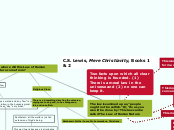C.S. Lewis, Mere Christianity, Books 1 & 2
This moral law is not just social convention.
If it were social convention, then we wouldn't be able to say that one convention is better than another.
This moral law is not just our instinct.
If it were instinct, we wouldn't be able to say that we ought to follow one instinct over another.
This moral law is not just what is useful for me or society as a whole.
If it were just what pays, then we would never do things that didn't benefit ourselves and have no reason to do so.
Two facts upon which all clear thinking is founded. (1) There is a moral law in the universe and (2) no one can keep it.
The law is summed up as, "people ought not be selfish." Or, "do as you would be done by." This law can be called The Law of Human Nature
So where did this Law of Human Nature come from?
Religious View
There is a Something directing the universe,
urging me to do good, to be courageous,
fair, and unselfish.
Dualism: there is a "good" diety
and a "evil" deity of equal power
and they are in conflict.
This can't work because two equal
and opposite deities can't logically
exist. How would we know to call
one "good" and one "evil" unless
we had a standard to measure them
by? In which case, there must be
a real standard of "good" above them
both, who would be the real God.
And, evil is only spoiled good anyway.
Evil is only a parasite on good--it can't
have its own, independent existence.
There is no such thing as Ultimate Bad for bad's sake--no one does evil simply to do evil. Evil always has an element of Good.
Pantheism: all the world is just an
extension of God's being.
This won't work because it eliminates
true good and evil. Nothing can be
truly evil if it's all just a part of God.
Abrahamic Faiths: Jews, Mohammedans, Christians.
The problem with this is that there is
so much evil in the world. How could
this world be an expression of this
"good" God's will?
Perhaps this God gave humans freedom which necessarily brings about choices which are not good. But this freedom also enables real love, which cannot be forced.
Because this God wants to give us happiness and peace, he tries to bring us to himself, the source of our happiness.
Jews
One Jewish man, Jesus of Nazareth, claims to be God, claims to be able to forgive sins. We must deal with him: who is he really?
Good Moral Teacher. This can't work because he doesn't say "good" things. He acts like a demagogue and makes outrageous claims that good moral teachers would never utter.
Lord: He really is God in the flesh, come to lead his people back to himself. The Word made flesh.
His sacrifice can put us right with God if we will put down our rebel arms and surrender to him as the true King.
Surrendering to him is called repentance, realizing we've been wrong and being willing to do things His way now.
We can't truly repent--surrender, submit, and die. We can only go through this process of repentence if God does it in us and God can only do it if he is a man like us.
So, Jesus' humanity is God meeting us where we are, helping us do what we could never do, paying our debt.
Having repented, and accepted Jesus' life in us,
we must maintain the Christ-life.
Holy Communion
Belief
Baptism
Lunatic: This doesn't work because he's too sane in his teaching and relationships to be a psychopath.
Liar: This doesn't work because he is too deeply committed to his message, even dying a horrible death for it and endangering the lives of his followers for it.
Good dreams: images of himself in mythology.
Conscience
Materialist View
Matter has always existed and any "law" is just
the result of evolution in the human animal.
Science doesn't say "why" only "what."
This is unsatisfying because when I
look inside myself, I find something like a mind directing or urging me to do right and avoid wrong. Pure science doesn't impose morality on creatures.









